
-
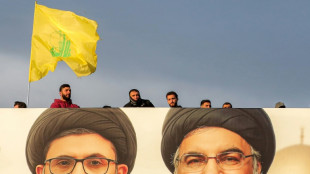 Tens of thousands pour in for Beirut funeral of slain Hezbollah leader
Tens of thousands pour in for Beirut funeral of slain Hezbollah leader
-
Ukraine contends with how to heal from three years of war

-
 Pope Francis, in critical condition, had quiet night: Vatican
Pope Francis, in critical condition, had quiet night: Vatican
-
Germans vote under shadow of far-right surge, Trump

-
 The 'new silent ones': Opponents lie low in Russia
The 'new silent ones': Opponents lie low in Russia
-
'Beyond a game' as Pakistan face India in must-win blockbuster

-
 Hong Kong and Singapore lead Asia's drive to cash in on crypto boom
Hong Kong and Singapore lead Asia's drive to cash in on crypto boom
-
Well-off Hong Kong daunted by record deficits

-
 Trump tariffs shake up China's factory heartland
Trump tariffs shake up China's factory heartland
-
Germany may face long wait for new government after vote

-
 Taiwan players go nuclear in Chinese invasion board game
Taiwan players go nuclear in Chinese invasion board game
-
Attacks, 'firewall' row, Trump: rocky run-up to German vote

-
 AI opens 'endless' doors for fashion models, closes others
AI opens 'endless' doors for fashion models, closes others
-
Top issues in Germany's election campaign

-
 Alice Weidel, unlikely queen of German far-right AfD
Alice Weidel, unlikely queen of German far-right AfD
-
Big turnout expected for Beirut funeral of slain Hezbollah leader

-
 Friedrich Merz: conservative on verge of German chancellery
Friedrich Merz: conservative on verge of German chancellery
-
Messi and Miami held by New York City in MLS opener

-
 Cheat sheet on Germany's colour-coded politics
Cheat sheet on Germany's colour-coded politics
-
Germans go to vote under shadow of far-right surge, Trump

-
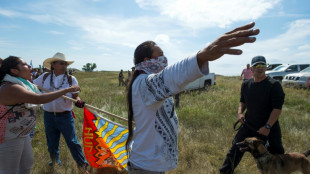 US pipeline case heads to court in high-stakes free speech fight
US pipeline case heads to court in high-stakes free speech fight
-
Trump shakes transatlantic alliance with Russia pivot

-
 Force coach Cron hails 'fight' as records tumble in Canberra
Force coach Cron hails 'fight' as records tumble in Canberra
-
Oscars favorite Baker says indie film 'struggling' as 'Anora' tops Spirit Awards

-
 Israel delays Palestinians' release after six Gaza hostages freed
Israel delays Palestinians' release after six Gaza hostages freed
-
Trump biopic director apologizes after actor's groping accusation
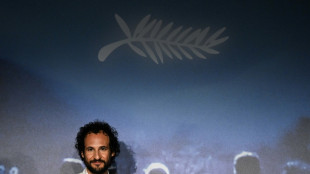
-
 Bivol takes Beterbiev's light-heavyweight crown in Riyadh classic
Bivol takes Beterbiev's light-heavyweight crown in Riyadh classic
-
Potgieter's lead shrinks to one shot at PGA Mexico Open lead

-
 Argentina's Milei praises Trump plan for reciprocal tariffs
Argentina's Milei praises Trump plan for reciprocal tariffs
-
Holloway, Russell cruise to hurdles wins at US indoor championships

-
 Barca battle to keep Liga lead as Atletico apply pressure
Barca battle to keep Liga lead as Atletico apply pressure
-
Barcelona claim narrow win at Las Palmas to reclaim Liga lead

-
 Martinez fires Inter top of Serie A as Milan fall at Torino
Martinez fires Inter top of Serie A as Milan fall at Torino
-
Itoje glad of England's 'hair-raising' win over Scotland

-
 'Worst is over' as Chile's 'stolen' babies reunite with mothers
'Worst is over' as Chile's 'stolen' babies reunite with mothers
-
Trump says US wants return on Ukraine aid money

-
 England-born Inglis relishes 'special' century for Australia
England-born Inglis relishes 'special' century for Australia
-
Pussy Riot stages pre-election Berlin show for Ukraine
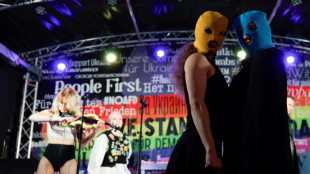
-
 Leverkusen ease to victory at Kiel to trim Bayern lead
Leverkusen ease to victory at Kiel to trim Bayern lead
-
'Now it's over' says Hermoso after Rubiales found guilty

-
 Germany on eve of vote expected to see far-right surge
Germany on eve of vote expected to see far-right surge
-
Spurs revitalised after Ipswich rout: Postecoglou

-
 Russell misses prove costly as England edge Scotland in Six Nations
Russell misses prove costly as England edge Scotland in Six Nations
-
Milei says welcomes Trump plan for reciprocal tariffs

-
 Premier League title out of Arsenal's control, says 'angry' Arteta
Premier League title out of Arsenal's control, says 'angry' Arteta
-
Asensio double punishes Jorgensen howler as Villa beat Chelsea

-
 Lille deepen Monaco's woes
Lille deepen Monaco's woes
-
Alvarez double takes Atletico top with Valencia win

-
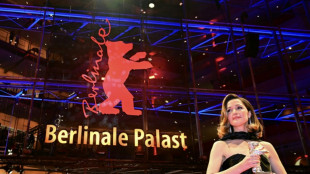 Norwegian film 'Dreams', Australia's Rose Byrne win at Berlin
Norwegian film 'Dreams', Australia's Rose Byrne win at Berlin
-
French star Jaminet returns after ban for 'stupid' racism


Cheat sheet on Germany's colour-coded politics
Germany holds elections on Sunday after its three-party "traffic light" coalition collapsed last year and could soon have a "black-red" government while a "Jamaica" or "blackberry" alliance is less likely.
Confused? Here is a cheat sheet for Germany's colour-coded party politics ahead of the pivotal vote in Europe's most populous country and biggest economy.
Every German party is traditionally associated with a colour, and national flags and other imagery are commonly used as shorthand for possible coalition combinations.
Here are Germany's main parties, their colours, leaders and what they stand for:
- Red: Social Democratic Party (SPD) -
The centre-left party of embattled Chancellor Olaf Scholz, 66, is Germany's oldest with origins in a labour association founded in the mid-1800s.
Its key demands are fair wages, safe pensions and social benefits, and its symbol is a red rose.
The SPD prides itself on its principled opposition to the Nazis before it was banned and its members exiled.
Party lore says that dialogue with Moscow, rather than confrontation, helped end the Cold War.
Prominent former SPD chancellors include Willy Brandt, Helmut Schmidt and Gerhard Schroeder.
- Black: Christian Democratic Union (CDU) -
Germany's main conservative party, led by former corporate lawyer Friedrich Merz, 69, prioritises boosting the economy, law and order and traditional social values.
Merz has promised to steer the party back to its right-wing roots, away from the more centrist course charted by former chancellor Angela Merkel.
He has vowed to strongly restrict irregular immigration and perhaps bring back nuclear energy, phased out under Merkel.
The CDU is in a permanent alliance with Bavaria's Christian Social Union (CSU) led by Markus Soeder.
Well-known former CDU chancellors include the first post-WWII leader Konrad Adenauer and Helmut Kohl, dubbed the father of Germany's 1990 reunification.
- Yellow: Free Democratic Party (FDP) -
The FDP, which promotes liberal economic policies and small government, was long Germany's main "third party" and has had a key role in building and bringing down governments.
Its leader, former finance minister Christian Lindner, 46, provoked the government crisis that came to a head when Scholz fired him on November 6.
The turmoil recalled a 1982 power play when the FDP switched sides, bringing down Schmidt, who was replaced by Kohl.
The FDP is sometimes mocked as the party of the rich but sees itself as a watchdog against government overreach, bureaucracy and red tape.
- Green: Alliance 90/The Greens -
The Greens emerged from the environmental, anti-nuclear and peace protest movement of the 1970s.
Its first MPs were elected in the early 1980s and they shocked the staid Bundestag when they showed up in knitted pullovers and put their feet on the benches.
But the party has since firmly entered the mainstream and advocates strong military support for Ukraine against Russia.
The current alliance was built in 1993 with activist groups from the formerly communist East Germany.
Vice-Chancellor Robert Habeck, 55, is the top election candidate of the Greens, which is also the party of Foreign Minister Annalena Baerbock.
- Blue: Alternative for Germany (AfD) -
The far-right party started off a decade ago as a eurosceptic fringe party but has since embraced a virulent anti-immigration agenda.
It railed against Merkel's 2015 green light to allow in more than a million migrants, many from war-torn Syria.
AfD politicians tend to doubt climate change, hold pro-Moscow positions and support US President Donald Trump whose ally Elon Musk has strongly backed the AfD.
Some AfD key figures have used Nazi-era phrases, and the domestic security services consider elements in the party to be extremists, fuelling calls to ban it.
With its top candidate Alice Weidel, 46, the AfD has been polling at around 20 percent, with most of its support in the ex-communist east.
All other parties have committed to an anti-AfD "firewall" of non-cooperation, although Merz breached this in late January when he accepted AfD support in parliament to pass a motion calling for an immigration crackdown.
- Violet: Linke and Alliance Sahra Wagenknecht (BSW) -
Germany's two far-left parties have hovered around the five-percent cutoff mark for reentry into parliament.
Die Linke has enjoyed a late poll surge above that mark, boosted by a spirited anti-fascist speech by its top candidate Heidi Reichinnek, 36.
The Linke's former leading figure, Sahra Wagenknecht, 55, left last year to form her own "left-wing conservative" BSW, which is sceptical of immigration.
Wagenknecht, who grew up in the communist East, promotes anti-capitalist views and opposes NATO, has struggled to maintain the initial buzz around her new party.
- Colourful coalitions -
Scholz's collapsed red-yellow-green coalition was dubbed the "traffic light" government.
In 2017 Germany almost got a black-yellow-green "Jamaica" coalition, before the FDP pulled out of talks.
Polling suggests Germany could next be headed for a CDU-led "black-red" grand coalition with the SPD that may need a third partner.
If the FDP were to join in, their colours would match the national flag for a "Germany" coalition.
If instead the Greens joined, this would lead to a black-red-green "Kenya" coalition.
Also seen at the state level before, but highly unlikely at the national level, is a black-red-violet alliance of the CDU, SPD and BSW, dubbed the "blackberry".
M.Thompson--AMWN